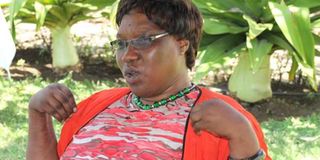Kenya faces deficit of 180,000 midwives as trained professionals seek better jobs abroad

Chairman of the Midwives Chapter of the National Nurses Association of Kenya Ms Louisa Muteti at the Reef Hotel in Mombasa on August 11, 2015. She said Kenya has a deficit of 180,000 professional midwives. PHOTO | WACHIRA MWANGI | NATION MEDIA GROUP
What you need to know:
- Ms Muteti said initially, Kenya used to train midwives but the government shelved the programme in the 1990s.
- The chapter said they are writing a policy to petition county and national governments to employ more midwives.
- Unlike nursing, midwifery is a delicate practice that needs a lot of detailed and gentle, friendly care.
- Ms Muteti said the career can only be improved by making it an independent profession to ensure accountability.
The country has a shortage of 180,000 midwives with Mandera County leading in the deficit, the Kenya Midwives Chapter has announced.
At the same time, some of the nurses trained in midwifery have opted to go and work abroad where the pay is more attractive.
Chairman of the Midwives Chapter of the National Nurses Association of Kenya Ms Louisa Muteti said Mandera lacks specialised midwives since it is a hardship area and due to insecurity.
Ms Muteti said currently, Kenya has about 2500 midwife nurses about 70 of whom have specialised in midwifery.
However, the chapter said they are writing a policy to petition county and national governments to employ more midwives to cater for the deficit that has led to deaths of expectant mothers and their unborn babies.
Speaking Tuesday at Reef Hotel in Mombasa ahead of their 21st Annual Scientific Conference dubbed ‘Improving Maternal and Neonatal Health: Where are the Midwives?’, Ms Muteti said the country needs a cadre called midwifery to salvage the situation.
REPRODUCTIVE HEALTH
“If anything, we need midwives to take up the role of midwifery and run with it to solve the issues of reproduction and deliveries.
"Nairobi County has the majority of midwives, Mombasa has a shortage but Mandera has the least,” she said.
Ms Muteti, a midwife with a Bachelor of Science degree in nursing and midwifery with 21 years of experience, said initially, Kenya used to train midwives but the government shelved the programme in the 1990s.
“The course was incorporated into nursing but we want to revitalise midwifery and improve maternal and perinatal mortality.
“The government did not foresee that the midwives who had specialised in midwifery would be phased out as some retired and others would die,” she said.
DELICATE PRACTICE
She said unlike nursing, midwifery is a delicate practice that needs a lot of detailed and gentle, friendly care.
“We have realised we cannot stem maternal and new-born mortality particularly the neonatal mortality while we lack professional midwives,” she said.
Ms Muteti said the career can only be improved by making it an independent profession to ensure accountability in midwifery as opposed to it being part of nursing.
She said majority of Kenyan professional midwives have left the country for greener pastures in countries like Britain, USA and Australia where they are well paid.





